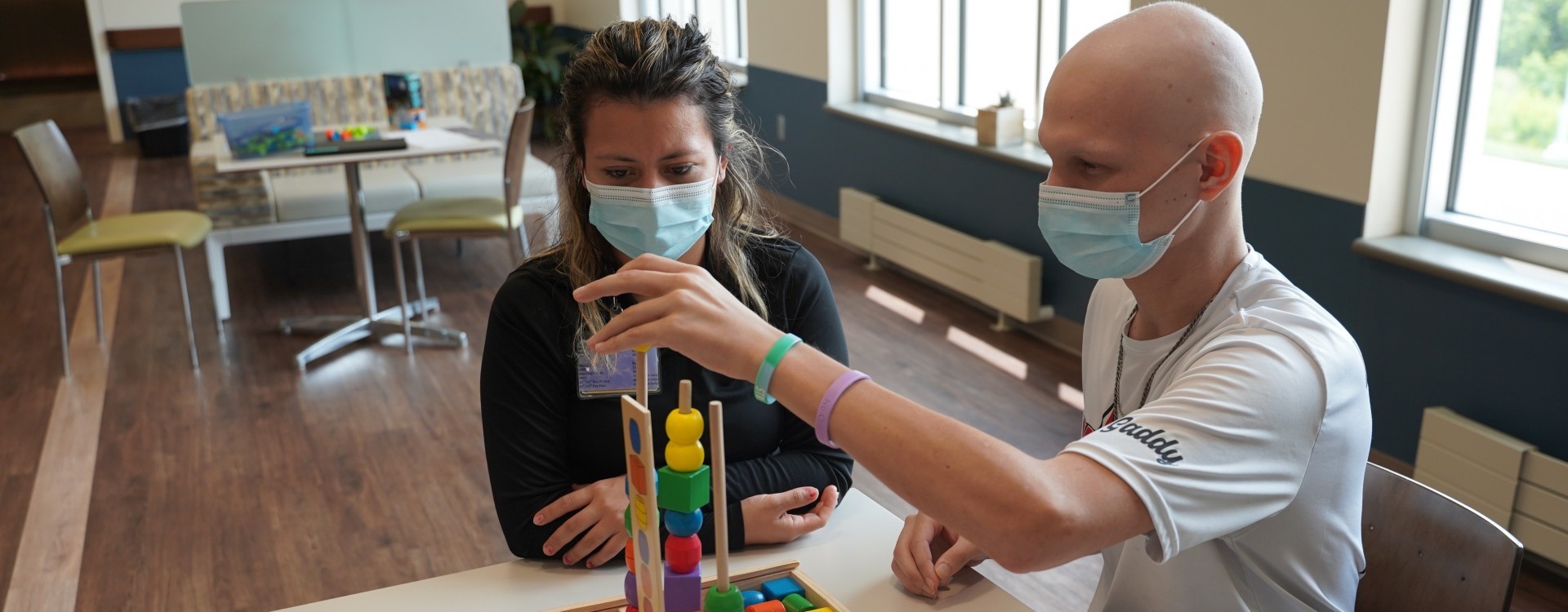Jacob Legleiter has been swinging a bat and running the bases for as long as he can remember. The 20-year-old loves the feeling of being on the baseball diamond. It’s something he hopes to get back to after beating metastatic cancer.
Life threw Legleiter a curveball when he was diagnosed in April 2021. He had surgery to remove some of his tumors and quickly started chemotherapy and radiation at Nebraska Medicine in Omaha. While receiving treatments, he also spent time at Madonna Rehabilitation Hospitals Omaha Campus in a specialized cancer rehabilitation program to build up his strength and stamina between rounds of chemotherapy.
“When I first came to Madonna, I was having some left-side weakness and was struggling to walk or use my left hand,” Legleiter said. “Because there were tumors in my brain, near my eyes, my eyesight was pretty bad, and I had some pretty bad double vision.”
Every cancer journey is different and specific to each patient. Madonna’s therapists understand it is a rollercoaster for the person who has cancer and their family. Starting slowly, Legleiter’s team worked to build up his activity tolerance and trained his family on how to assist him during every phase of treatment, the good days and the bad days.
“We empower the patient and the family to be able to help out at different levels of care so they can stay home as long as possible,” said Celeste Baumert, cancer program manager. “Once they leave Madonna, it’s not realistic for them to come back every time they have a new cancer treatment. That could be years. We have to educate both the patient and the family on what to expect in the future from chemotherapy, radiation or surgeries they might have and what common deficits they will deal with afterward.”
Madonna’s cancer program team is expertly trained in navigating the highs and lows of a cancer journey and takes a holistic approach to care. Staff is able to adapt each patient’s customized treatment plan to account for new deficits that may arise after each round of cancer treatment.
In addition to addressing physical challenges, Madonna’s physicians, therapists and nurses focus on the mental and emotional toll cancer can take on someone.
“I think a lot of times when people hear that ‘c-word,’ things shut down,” Baumert said. “We make sure to acknowledge those feelings, as well as offer programs like our resilience class where patients can learn different healthy coping strategies and how they can talk to their loved ones about their diagnosis and concerns. We also focus on goal setting and empowering the patient to advocate for themselves.”
Just like on the field, Legleiter had an army of supporters cheering him on as he fought his diagnosis. His family organized a drive-by parade with his teachers from Omaha Skutt Catholic High School to stop by and offer words of encouragement. His parents also worked closely with therapists to identify things that would motivate and inspire him to work hard.
As he got stronger, Legleiter’s care team incorporated his athleticism and competitive nature during therapy to keep him engaged and push him to reach his highest level of independence. In physical therapy, therapists kept track of his left arm’s strength and coordination with a friendly game of “Cornhole.” He also improved his balance with ring toss. In occupational therapy, Legleiter raced against the clock to match patterns of blocks, challenging his vision and cognition.
Legleiter’s dedication and determination earned him a Madonna Spirit Award.
“Jacob always had a super positive attitude and came to therapy ready to work hard, despite not feeling the greatest,” said Bianka Alvarado Milla, an occupational therapist. “He always would challenge himself to do better each time. If one day he couldn’t move his left side, the next day he would try even harder.”
Now that his chemotherapy is complete, Legleiter was able to return home and continue his therapy at Madonna in the Rehabilitation Day Program on an outpatient basis. He plans to return to his college classes in the spring semester with plans to become a doctor, so he can interact with and inspire patients who have gone through similar circumstances.





